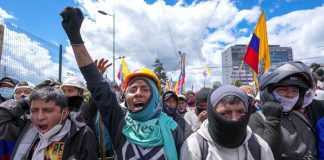Smoke from burnt out buses and fire bombs filled the streets of Bangkok this month as the Thai army launched a crackdown on the Red Shirt protesters who are challenging the government.
Troops used automatic weapons to fire into demonstrations. At least 100 people were injured in the first hours of the offensive and there are reports of fatalities.
The Red Shirts have been driven off the streets for now, as the government launches a wave of arrests of protest leaders. But the standoff in Thai politics has not been resolved.
These protests mark the latest stage in a power struggle that has continued on and off since 2005. Abhisit Vejjajiva came to power last December after a political coup and mass protests by the Yellow Shirt movement.
The colour code that identifies the two movements means much of the media acts as if there is some kind of equivalence between the Red Shirts and the Yellow Shirts. This is not true.
The Red Shirts are a pro-democracy movement, associated with the United Front for Democracy Against Dictatorship (UDD).
They are largely made up of the urban and rural poor who support the pro-poor policies of former prime minister Thaksin Shinawatra. He was prime minister from 2001 until the constitutional court removed him in 2006. Red Shirts demand that the government resign immediately and allow new elections to be held.
Banned
The Yellow Shirts, on the other hand, come out of the People’s Alliance for Democracy (PAD)—an authoritarian royalist movement with fascist tendencies. They are part of the present Democrat Party government.
The PAD has the backing of the military leaders and the judiciary who have banned two democratically elected parties and participated in two coups in recent years.
The Red Shirts reappeared on the streets last month, after being temporarily cowed by a crackdown last December.
They scored a major success with a protest at the Association of South East Asian Nations (ASEAN) summit. As the Asian leaders gathered in the resort of Pattaya throngs of protesters blocked off the hotel compound.
By Saturday they had forced their way into the buildings where the summit was to be held, causing panic and the rapid departure of ministers to hastily arranged jets.
The government was severely embarrassed. Initially, the army and the authorities seemed uncertain how to respond.
The Red Shirts gained confidence and intensified their protests. They stormed the interior ministry and occupied more than 20 major road intersections.
The police estimated that up to 30,000 protesters were on the streets. Then the army crackdown began. Despite its brutality, the US state department responded by condemning the “unacceptable violence” of the protesters.
Thai socialist activist Giles Ji Ungpakorn, who was forced to flee to Britain after the coup last December, told UK Socialist Worker, “Over the past few days, the Red Shirts have shown signs of self-leadership to such an extent that the old Red Shirt politicians are running to keep up.
“A republican movement is growing. Some left-leaning Thais, like myself, are not Thaksin supporters.
Democracy
“We opposed his human rights abuses when he was in power. But we are the left wing of this citizens’ movement for real democracy. We want an end to the long-accepted ‘quiet dictatorship’ of the army generals and the palace.”
Giles reports that although the Red Shirts movement is leading some to republicanism, many more are arguing for a constitutional monarchy where the royal family keep out of politics.
Despite the fact that most of the movement continues to support Thaksin, it is being swelled by those who reject the leadership of the billionaire former prime minister. The Financial Times this week reported that the Red Shirt movement, “has won the support of many Thais who do not necessarily support Mr Thaksin but have united with his more traditional supporters in opposition to the powerful unelected and unaccountable centres of power that back Mr Abhisit”.
The brave and continuing resistance of the Red Shirts is a positive development.
But for the hopes of the ordinary people who back it to be realised, the movement’s demands must move beyond calling for the return of Thaksin.
Workers have this week shown their strength. They will need to develop that confidence and be prepared to make their own demands if the Yellow Shirts—and the generals, judges and royals behind them—are to be defeated.
by Ken Olende, Socialist Worker UK





